- Home
- Saul Tanpepper
THE FLENSE: China: (Part 1 of THE FLENSE serial) Page 10
THE FLENSE: China: (Part 1 of THE FLENSE serial) Read online
Page 10
“Is this for the train wreck victims?”
The man did not answer. Instead, he bent down again and scratched a pattern into the face of an exposed rock with a sharpened point of stone. It was a circle with many lines radiating outward.
“The sun?” Angel pointed into the cloudless sky.
Once more instead of answering, the man grabbed her hand and traced a gnarled finger over the line of her veins on the back.
Sun? Lifeblood? Angel didn’t understand. She sighed and shrugged. “Why did you bring me here?”
The man jabbed his crooked finger once again at the drawing.
“I don’t understand.”
But this time the old man only raised a hand to silence her. Then he closed his eyes, indicating that Angel should do so as well. So she did. And they stood on the top of that hill while the chill wind spun around them and the strips of cloth fluttered. Angel didn’t know what she was supposed to do. She guessed maybe listen, but if the world whispered its secrets to the old man, it did not share them with Angel right then.
Finally, she opened her eyes and looked about her. The man was gone, and the ground at her feet was nothing but bare rock. The drawing and the ovoo were gone. Angel let out a cry of dismay and raised her hands to her numb face. Was she going crazy? Her fists were clenched, and when she opened them she found that she was holding a scrap of cloth, its edges torn and burned. She recognized it as being from the shrine.
Far below, a large truck rumbled along the road, the sound of its engine a thin tremulous whine fighting against the wind. Unable to form coherent thought, unable even to breathe, Angel tracked the movement with her eyes until they came to rest upon the very edge of a scorched and barren piece of earth.
There was the crash site.
Chapter Fourteen
The track ran straight for another kilometer or so before curving gently around the base of a hill. Angel saw the first of the train cars there. It was lying on its side some ten or twelve meters off the rails to the right. The scar it had left in the land still bled with what appeared to be oil or diesel fuel. She kept on walking.
A second car emerged into sight, still incredibly attached to its neighbor by a single black cable. Only half of the car was visible, the rest blocked by a jagged edge of shredded metal. The car sat upright, though it had obviously flipped onto its side at one point before coming to rest again on its wheels. The windows were smashed, the empty spaces resembling gouged eye sockets marked by soot, telling a tale of a terrible fire. The paint had darkened and peeled away.
There were no more cars to see, nothing recognizable as cars anyway. What she found instead as she drew closer was bits and pieces, heaps of twisted and burnt metal spread out over an expanding swath of land. The cleanup crew had already begun bulldozing it into piles for removal.
Angel stopped and tilted her head to listen for the sounds of machines, but she heard nothing other than the lonely moan of the wind. It had died down somewhat in the past half hour that it took her to reach the site from the hilltop. The day was warming up, and she was sweating inside her parka. In that time, she had managed to convince herself that the man and ovoo had indeed been real, despite both having vanished. Perhaps she had walked to another hilltop while in some sort of trance state. If she went back, she was sure she could find them. After all, what other explanation could there be for the scrap of cloth in her pocket?
She shook away the distraction and focused once more on the scene before her.
Where are the people?
The place appeared deserted.
She drew closer to the train car, which loomed up before her like the hollow carcass of some ancient behemoth frozen in rigor, its insides completely eviscerated and dragged away by the carrion-eating machines. The latter now sat dormant nearby, as if in some hibernating state.
She realized the parallels here: the scene before her was, in a sense, a kind of sky burial in its own right.
One of the wheel sets had been wrenched away from the frame and now stuck out at an odd angle. Angel skirted the car to the side opposite the tracks and gasped to see that most of the base had been peeled back. A few passenger seats littered the earth ahead, their upholstery consumed by a fire now extinguished and cold. Little remained other than a few coiled springs and tangled metal tendons. The air stunk of burnt steel and plastic, a caustic chemical tang.
Her eyes drifted immediately to the ground, searching. But she saw no bodies. No body parts. They had already been systematically removed.
Not that there would have been much left, judging from the extent of the destruction. Much of what hadn’t been immediately vaporized would have been incinerated afterward by the fire that swept through here.
The vultures will not be eating well tonight.
She shuddered and chastised herself for having such a morbid thought.
The front half of the second car was gone, amputated by the force of the crash. It now lay on the cold ground, flayed completely open, everything not metal burned away. Many of the parts were warped beyond recognition.
Where are the people, the cleanup crew?
Just past a heap of rubble stood a crane, its arm extended out over a smaller mound, but its claw frozen open and still. It swung slightly in the wind, creaking eerily. The cab was empty. A dump truck sat inert beside it. Then several more vehicles, similarly quiet. Over in the middle of everything was a supply truck, a ramp leading up to the bed and a handcart leaning against the side. The door was rolled three-quarters of the way shut. A forklift was parked beside it.
Yet another truck had a refrigeration unit mounted above the cab. Angel wondered if it had held the bodies.
Parts, not bodies.
She placed a hand on the crane’s radiator grill and was surprised to find that it was still warm. People were here— had been here recently. But where were they now?
A gust of wind brought a strange, vibrating sound to her ears. Tracking it to its source she saw a tent staked tightly into the ground. The sides bulged outward, and its ropes thrummed in the stiff breeze.
Positive pressure enclosure. It was meant to keep the outside air from entering.
She edged around the site, moving toward the back of the tent, where she confirmed her suspicions. Over the hum of the air compressor and filtration units, she couldn’t tell if people were inside, but she had to assume so when the smell of coffee came to her. She had lucked upon the recovery effort during a break.
The scene on Huangxia flashed through her mind, the soldiers with their rifles intimidating her and DeBryan. She had been similarly threatened on at least a half dozen occasions over the past few years, been subjected to tear gas and immobilized by concussion grenades meant to disable aggressive protesters, so she was no stranger to the use of force. Once, while covering a story in Mexico City, she’d even been shot at with bean bags. A colleague of hers suffered a hit to the thigh, and while it hadn’t broken the skin or bones, the bruise stretched from her knee to her hip. In general, police and other security forces in an area tended to treat the media as non-hostiles, but it was never a guarantee, and the situation could become quite fluid very quickly.
It was the private security forces which scared her the most. They acted aggressively all the time, often without concern for the rights of the press and private citizens.
If it was any consolation, there did not appear to be any security personnel here, whether private or otherwise.
She didn’t have her credentials on her anyway. If she’d known she was coming out here, she would have been sure to bring them, along with her personal protective hazard suit.
The thought of not having her gear almost forced her to go back.
You're here now. It would be a wasted opportunity.
Her eyes shot over to the supply truck, and an idea took shape in her mind. She’d need to get to it unseen, and the fastest way to it was over open ground. Circling around, using the piles of scrap and debris to conceal herself would be s
afer, but it would take much longer.
Quickly unzipping her parka, she squeezed it into a tight ball and shoved it into a narrow space between one of the air pumps and the tent, remembering first to fetch her phone and the ribbon from out of the pocket. The bright colors would easily catch someone’s attention, and anyway, with what she was planning, it would just get in her way. Then she sprinted across the field heading straight for the truck.
Ten meters out, fifteen, and the whine of the air pumps behind her changed. People had entered inside the airlock, the tunnel leading outside. In seconds they would be exiting. She didn’t bother looking back, just picked up her pace.
The ground was an open lesion before her, scraped and scarred by the bulldozers and made uneven both by the rocky composition and the tracks of the heavy machines. Large chunks of debris still lay scattered about.
Angel stumbled, flailed her arms and tried to catch her balance. But she was going too fast and her feet tangled. She landed hard, rolling in the dirt and scraping both arms. Spinning her head around, she caught a glimpse of the first people exiting the tent a hundred meters away. They were wearing the blue suits Jian had described.
Angel froze, instinctively pressing herself down against the dirt.
More men poured out, but they simply gathered by the exit and stood there talking. She could hear them, the muffled sounds of their voices. A few broke off, headed away from her, and disappeared around the far corner of the tent. The rest remained in a huddle.
Fifteen meters of ground separated her from the truck. Fifteen meters which she might be able to cover in about six or seven seconds.
Two more men peeled off the group. They turned and headed directly toward her. Angel was stuck. If she stood now, they would see her. If she ran, she’d look suspicious.
They’re going to find you anyway.
She started to push herself up when one of them stopped and grabbed the other’s arm. After a moment’s hesitation and a few words exchanged, they pivoted on the plastic heels of their hazard suits and headed back. Angel was on her feet and running before they’d even finished turning. She angled for the side of the ramp and swung her body onto it, then rolled beneath the lift gate in time to turn around and see four more men emerge from behind the side of the tent. Two had large silver tanks on their backs and long metal nozzles in their hands. The other two carried shovels. They all headed across the open field toward her.
Angel lay in the darkness panting, watching the men spread out. The ones with the shovels began pacing along the area she’d just crossed, their eyes cast downward, presumably searching for items important for furthering their investigation. They moved slowly, carefully, covering the ground in a grid pattern. Every so often they would stop and poke at something with their shovel or flip it over. Then they’d move on.
After a few minutes the familiar growl of the crane’s engine came to her, and soon after that came the crunch of the claw digging into the pile of scrap. There was a gut-wrenching crunch as it released its cargo into the bed of the dump truck. The low growl of the bulldozer grew louder as it edged closer, then drew away to the opposite side of the site. The cleanup crew’s work had resumed.
Angel sat up and looked around her. The supply truck was stacked high with metal crates, all painted light blue and labeled with their inventory. Each was latched tight with two snap clasps, but not locked. She started going through them, not sure if she’d find what she was looking for.
There were the usual spill cleanup kits, body bags, decontamination supplies. She found the spare hazmat suits hanging in an upright locker near the back, but no helmets. The suits would be useless to conceal her without them. Even with a full suit on, she’d still be limited in where she could go. She was beginning to question the sensibility of her plan.
She pulled aside several large jugs of water and a stack of smaller plastic tubs of some pink liquid, which she confirmed were chemical disinfectant manufactured in East Hemlington, New Jersey.
A truck rumbled past the opening, spewing blackened dust. Angel stepped over to check and watched it disappear out of view to the right. There again were the two men with the tanks on their backs standing at the very edge of the scorched field, getting ready to spray the ground, probably with some sort of chemical neutralizer.
Angel returned to her search for the helmets. They had to be buried inside one of the other cases, but which one?
She pushed further into the gloom, once again using her phone for light. Strapped in against the back wall were a half dozen fifty-five gallon drums sealed with heavy-duty tamper-proof tape, three on either side of a sliding door which led to the cab. She almost ignored the containers, but stopped when she recognized the warning symbols for flammability, corrosion, and poison. Bending down, she squinted at the paper label affixed below them. Among the words she read were naphthenate and palmitate. She tried to remember what those chemicals might be used for. When an image did come to mind a moment later, it sucked the breath from her chest.
Napalm!
There was enough here to incinerate the entire accident scene, maybe more.
She scrambled back to the door and peered out into the daylight. The two men were working the field, slowly spraying the ground just as she’d expected. But what came out of the ends of the nozzles wasn’t liquid. Instead, it was ten meters of white-hot flame. These people weren’t investigating an accident. Nor were they cleaning it up. They were sterilizing the scene, erasing any evidence of what may have caused it.
She sucked in a sharp breath. Cheong had been right to be suspicious. This was yet another cover-up.
That didn’t, however, mean he was right about it being caused by some disease. The suits in those lockers, the same ones worn by the men outside, weren’t biohazard suits, they weren’t even strictly airtight.
Propped up on her elbows so she could hold her phone steady, Angel began to collect a video record of the scene. She started with the crane as it worked its pile of incinerated rubble and panned over to the men with the flame-throwers. When she angled back, her heart nearly stopped. A man was walking out from behind the tent. In one arm, he held her parka. He waved his other at the men with the shovels, trying to draw their attention.
In a lull in the racket she heard him shout in English, “Who does this belong to?”
Chapter Fifteen
“Americans? They are Americans?”
It explained the labels on the crates, the sources of the material.
Angel scrambled back into the darkness, quickly stuffing the phone back into her pocket.
“Merde,” she whispered. “This is not good!”
The men out there weren’t here on behalf of the railroad or the government. They were company people, and it was clear they intended to hide something. If she were found, they would first question her, maybe even torture her. Finally, after they decided they’d learned enough from her, they would make her disappear.
Don’t be ridiculous.
She could hear the crane still digging away, and the intermittent growl of the flame throwers burning the air. The bulldozer was scraping rubble into a new pile. Two more men with flamethrowers stood nearby, ready to ignite it. She still had a few moments before they realized the parka wasn’t any of their own. A few seconds after that, they would decide to search the area for its owner. It was time to go.
But how? The supply truck was right in the middle of the site, and there was too much open ground around her. Surely someone would see her.
Desperately, she pulled one of the hazmat suits out of the locker and exhaled in relief as she realized the collapsible helmets were already attached at the back. They’d just been hidden from view. She stepped into it, fumbling her fingers into the gloves and putting a small tear in the leg as it caught on one of the metal clasps of the case at her feet. Then she quickly zipped the suit shut over her chest. Peeling away the protective adhesive strip, she pressed it hastily closed, sealing her inside. Finally, she swung the he
lmet over her head and sealed it, too. It sat slightly cockeyed on her shoulders, probably enough to be noticeable to someone standing close by. She didn’t plan to get near enough for anyone to see.
Going out through the loading door was not going to work. It was too exposed, and anyone seeing her would be suspicious if she crawled through it. Pulling the door fully open would draw unwanted attention. She stepped back into the darkness, past the drums of napalm. Exiting through the cab was her only real option. She had to hope the crane driver would be too distracted to notice. He was the closest, and had a direct line of sight to her. She wrapped her fingers around the handle and pulled.
It didn’t move.
She tugged harder, but it was stuck. Or locked.
No, no, NO!
She bent down to inspect it, but the lighting was too poor. Her phone was in her pocket inside the suit. And there was too little room to stand aside to let in more from outside.
Looking back across the bed of the truck, she could just see the man with her parka talking with the men with shovels. One of them pointed to her right, to the men with the flamethrowers.
Angel turned back to the cab door. It was awkward moving around in the cramped space, and the helmet was too skewed and kept blocking half her view. She tried again, pushing the handle now from the lower vantage point, cursing when it wouldn’t go. Then she saw the safety catch.
Her gloved hands were too clumsy to work it. The catch was just a small tongue of metal, dangling on a swivel and preventing the handle from inadvertently opening during driving. But she couldn’t get her fingers behind it to move it out of the way. The damn thing just kept falling back!
“Damn it damn it dammit!” she growled.

 Open Wide
Open Wide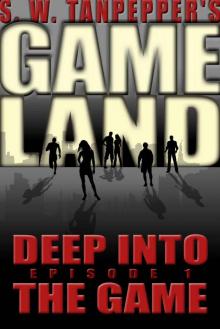 Deep Into the Game: S.W. Tanpepper's GAMELAND (Episode 1) (Volume 1) (S. W. Tanpepper's GAMELAND)
Deep Into the Game: S.W. Tanpepper's GAMELAND (Episode 1) (Volume 1) (S. W. Tanpepper's GAMELAND)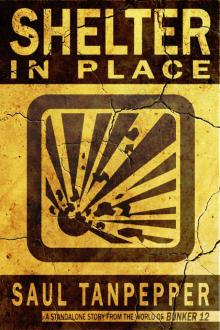 Shelter in Place: A short story from the world of BUNKER 12
Shelter in Place: A short story from the world of BUNKER 12 Iceland: An International Thriller (The Flense Book 2)
Iceland: An International Thriller (The Flense Book 2) GAMELAND Episodes 1-2: Deep Into the Game + Failsafe (S. W. Tanpepper's GAMELAND)
GAMELAND Episodes 1-2: Deep Into the Game + Failsafe (S. W. Tanpepper's GAMELAND)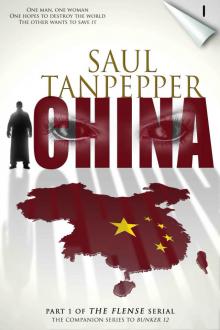 THE FLENSE: China: (Part 1 of THE FLENSE serial)
THE FLENSE: China: (Part 1 of THE FLENSE serial) S.W. Tanpepper's GAMELAND, Season One Omnibus
S.W. Tanpepper's GAMELAND, Season One Omnibus Golgotha: Prequel to S.W. Tanpepper's GAMELAND series (S. W. Tanpepper's GAMELAND companion title Book 1)
Golgotha: Prequel to S.W. Tanpepper's GAMELAND series (S. W. Tanpepper's GAMELAND companion title Book 1)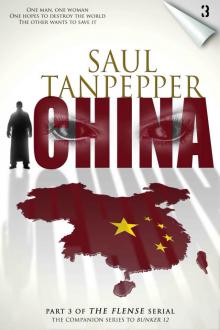 THE FLENSE: China: (Part 3 of THE FLENSE serial)
THE FLENSE: China: (Part 3 of THE FLENSE serial)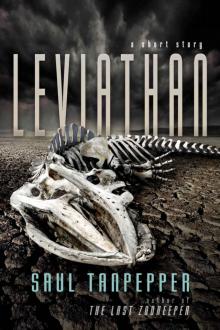 Leviathan: A Short Story About the End of the World
Leviathan: A Short Story About the End of the World Insomnia: Paranormal Tales, Science Fiction, & Horror
Insomnia: Paranormal Tales, Science Fiction, & Horror Velveteen
Velveteen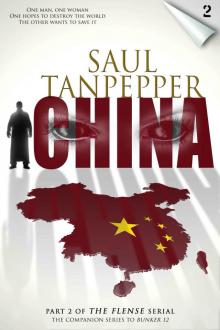 THE FLENSE: China: (Part 2 of THE FLENSE serial)
THE FLENSE: China: (Part 2 of THE FLENSE serial) Deadman's Switch & Sunder the Hollow Ones
Deadman's Switch & Sunder the Hollow Ones